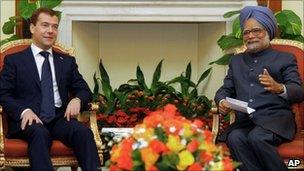Russian president seals Indian defence deals
- Published

Business as usual? Russia has been facing stiffer competition for a slice of India's defence market
Russian President Dmitry Medvedev has signed nuclear and defence agreements worth billions of dollars during a two-day visit to India.
He has met Indian PM Manmohan Singh in Delhi on a trip that saw handshakes on the joint development of a so-called fifth generation stealth fighter jet.
There was also an agreement to supply more Russian nuclear power reactors.
All five permanent UN Security Council members have now made trade-focused visits to India in recent months.
The BBC's Mark Dummett in Delhi says the visits are a sign of India's growing clout on the world stage. As recession bites elsewhere, India is booming, he points out.
A Cold War ally and for many years the default weapons supplier to India, Russia has faced tough competition from Europe and the US for a slice of Delhi's booming defence market.
Wary of its rising regional rival, China, India is now one of the world's largest buyers of fighter jets, tanks, submarines and other defence equipment.
UN seat support
As Mr Medvedev and Mr Singh met on Tuesday, nearly a dozen agreements were signed in such areas as energy, technology and chemicals.
The setpiece was a long-awaited deal for the joint production of a fifth-generation fighter. India reportedly plans to take as many as 300 of the aircraft.
On the nuclear front, Mr Medvedev agreed to provide another two civilian nuclear energy reactors in the southern Indian state of Tamil Nadu, where Russia is already setting up two reactors.
Energy-hungry India is one of the world's biggest nuclear power markets, with plans to expand its capacity nearly 15-fold to 63,000 megawatts by 2032.
The Russian president, who was joined by about 100 business leaders, is also meeting ruling Congress party president Sonia Gandhi in Delhi.
On Wednesday, he will tour the Taj Mahal in Agra and India's financial capital, Mumbai (Bombay).
In a joint statement, Russia voiced its support for India "as a deserving and strong candidate" for a permanent seat in an expanded UN Security Council.
US President Barack Obama voiced similar backing for India's hopes of a place at the UN's top table during his visit in November.
Hailing what he described as a "special and privileged" strategic partnership, Mr Singh said Russia was a "time-tested friend... that has stood by us in our times of need in the past".
"It is a partnership that has, and will continue, to develop independently of our relations with other countries."
On Monday, Delhi and Moscow agreed to double bilateral trade from the current $10bn over the next five years.
British Prime Minister David Cameron visited India in July, and President Obama, French President Nicolas Sarkozy and Chinese Premier Wen Jiabao have passed through over the past six weeks.
Each was also accompanied by a large business delegation, and each has gone home boasting of billions of dollars of extra trade with one of the world's fastest growing economies.
- Published21 December 2010
- Published7 October 2010